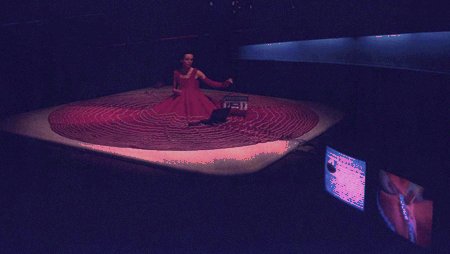 Regena Frank, Hermes' Mistress,1994-1996,Wacdal art Center,Tokyo Slavoj Zizek Excerpt from "Virtualization of The Master" |
| The key for the status of Virtual Reality is provided by the difference
between imitation and simulation: Virtual Reality doesn't imitate reality,
it simulates it by way of generating its semblance. In other words, imitation
imitates a pre-existing real-life model, whereas simulation generates the
semblance of a non-existing reality - it simulates something that doesn't
exist. Let us take the most elementary case of virtuality in a computer,
the so-called "virtual memory": a computer can simulate far greater memory
than it actually has, i.e. it can function as if its memory is larger than
it effectively is. And does the same not hold for every symbolic arrangement,
up to the financial system which simulates a far larger extent of coverage
than it is effectively able to provide? The entire system of deposits,
etc., works on the presupposition that anyone can, at any moment, withdraw
his or her money from the bank - a presupposition which, although it
can never be realized, nonetheless renders possible the very "real," "material"
functioning of the financial system...
...The philosopher who provided the best conceptual apparatus to account for Virtual Reality was Malebranche, with his occasionalism. Malebranche, a disciple of Descartes, drops Descartes' ridiculous reference to the pineal gland in order to explain the coordination between the material and the spiritual substance, i.e. body and soul; how, then, are we to explain their coordination, if there is no contact between the two, no point at which a soul can act causally on a body or vice versa? Since the two causal networks (that of ideas in my mind and that of bodily interconnections) are totally independent, the only solution is that a third, true Substance (God) continuously coordinates and mediates between the two, sustaining the semblance of continuity: when I think about raising my hand and my hand effectively raises, my thought causes the raising of my hand not directly but only occasionally upon noticing my thought directed at raising my hand, God sets in motion the other, material, causal chain which leads to my hand effectively being raised. If we replace God with the big Other, the symbolic order, we can see the closeness of occasionalism to Lacan's position: as Lacan put it in his polemics against Aristotle in Television, the relationship between soul and body is never direct, since the big Other always interposes itself between the two. Occasionalism is thus essentially a name for the arbitrary of the signifier, for the gap that separates the network of ideas from the network of bodily (real) causality, for the fact that it is the big Other which accounts for the coordination of the two networks, so that, when my body bites an apple, my soul experiences a pleasurable sensation. This same gap is targeted by the ancient Aztec priest who organizes human sacrifices to ensure that the sun will rise again: the human sacrifice is here an appeal to God to sustain the coordination between the two series, the bodily necessity and the concatenation of symbolic events. Irrational as the Aztec priest's sacrificing may appear, its underlying premise is far more insightful than our commonplace intuition according to which the coordination between body and soul is direct, i.e. it is natural for me to have a pleasurable sensation when I bite an apple since this sensation is caused directly by the apple: what gets lost is the intermediary role of the big Other in guaranteeing the coordination between reality and our mental experience of it. And is it not the same with our immersion into Virtual Reality? When I raise my hand in order to push an object in the virtual space, this object effectively moves my illusion, of course, is that it was the movement of my hand which directly caused the dislocation of the object, i.e. in my immersion, I overlook the intricate mechanism of computerized coordination, homologous to the role of God guaranteeing the coordination between the two series in occasionalism.
|
 |